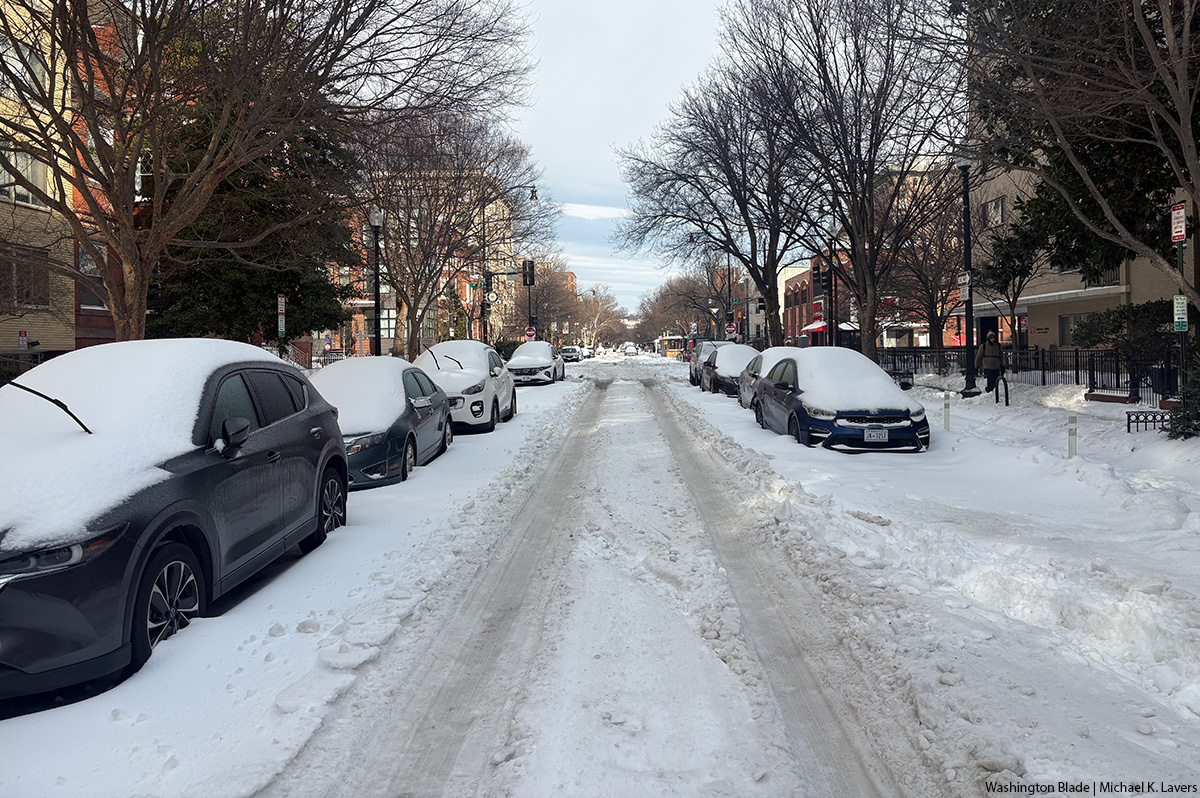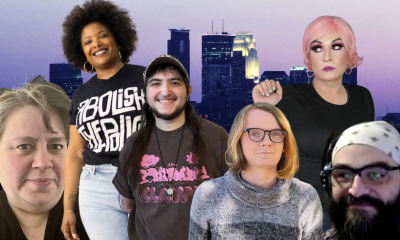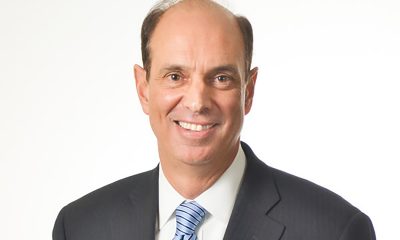Opinions
Cure for a sickening appointment
Confronting the grief and havoc of these past four years can yield hope


When a lifetime nomination for the Supreme Court becomes the source of spreading a deadly virus, it should be taken as an omen.
Exactly one month after “Rona” crashed the maskless White House party for Judge Amy Barrett’s appointment, infecting staff, at least two senators and perhaps the feckless president himself, she has gained one of the nine mightiest seats of judgment in this nation.
Even when the reign of terror by the Trump administration ends, Judge Barrett’s addition to the high court is likely to extend its carnage in the lives of millions of LGBTQ Americans. Decades of hard-won progress for anti-discrimination protections and family recognition are now imperiled by the shifting math. This includes grave danger to the precedents for privacy in Roe v. Wade and Casey and even Lawrence in which is anchored the landmark ruling in Obergefell for marriage equality.
If settled laws establishing Social Security and Medicare are back on the table, as Barrett suggested at her Senate hearing, are even the laws to punish hate crimes safe?
Like the utter surrender of all the president’s men to COVID, the calamity of a right-wing, interventionist Supreme Court poised to invalidate even state-based safeguards against bias and hate could inflict vast casualties. The most vulnerable and least protected could pay the highest price.
No wonder LGBTQ people are in revolt, and voting as if our lives depend on it. Paul Monette, the gay writer who died of AIDS a quarter century ago, argued that grief is either a sword or useless. Gloria Anzaldúa, the late lesbian academic, essayist and activist, described darkness and sorrow as laboratories for the most potent rebellion.
Perhaps more than any time since the early 1990s, the LGBTQ community is enraged and engaged in electoral politics, poised to play a key role in transforming all three branches of government, including at the state level. This upsurge comes with the added attention to racial injustice, misogyny and anti-immigrant and anti-Muslim bigotry, which portends more lasting and much larger coalitions for change.
Fighting back begins with casting complete ballots. It must include visibility in the rallies and activism accompanying transitions of power. It requires participation by LGBTQ leaders in the redistricting process in the states, which draw boundaries that shape representation and how advocates might wield influence for the next decade.
Fighting back also compels that advocates seize the teachable moment on court reform. For more than 30 years, conservatives have been using their legislative authority in the states to expand supreme courts, including recently in the states of Georgia and Arizona. These states are noteworthy for their lack of anti-bias laws covering LGBTQ people and their emerging “swing” status that jeopardizes one-party Republican control. This specter was an unmistakable motivating factor for so-called “court-packing” by conservatives to cement a kind of veto power against policy gains for LGBTQ people and other long-ignored communities. Call it a trump card, a term with added meaning now at the federal level.
Republican condemnation of increasing the size of the U.S. Supreme Court while conducting such maneuvers at the state level has a familiar ring of hypocrisy. It builds on Republican senators’ breaking their own professed standard from 2016 about no appointments to the high court in a year of Presidential voting. The hubris and contempt for truth flaunted in their pre-election haste to install an ideological foe of LGBTQ rights on the court have now become a trigger. For Democrats, altering the composition of the high court may be justified as a consequence. For the LGBTQ community, the focus must remain on ending the onslaught on our freedom and the legal protection of our lives and families.
The denial of COVID by the Trump administration holds echoes of the past. Refusal to reckon openly, factually and humanely with HIV-AIDS by the Reagan White House begat other cruelties, and so has this one. The entire process of strong-arming Judge Barrett into the seat left vacant by the passing of Ruth Bader Ginsburg is soaked in sickness more malignant than the cancer that claimed the late Justice.
Voting alone does not erase the anguish and trauma of such wicked, corrosive hypocrisy. But voting in enormous numbers is one antidote, even more potent if it ushers in diversity of representation as part of pro-LGBTQ majorities. Legislation to reform the high court, a product of changed chemistry in the Congress, could be a lasting cure. It might even inspire similar, complementary reforms in some states. The grief and havoc of these past four years, confronted boldly, can yield an outgrowth of hope.
Hans Johnson has advised LGBT organizations and ballot measure campaigns in nearly every state. A longtime Washingtonian and former Blade columnist, he now lives in Los Angeles.

First what isn’t. That would be snow removal in D.C. I understand the inches of sleet that fell on the nearly four inches of snow, and historic days of freezing weather, make it very difficult. But it took three days until they brought out the bigger equipment. Then businesses and homeowners were told they wouldn’t be fined for not clearing their sidewalks, which they have to do by law. That clearly made things worse. The elderly and disabled have an exemption from that, others shouldn’t be given one. Then there was no focus on crosswalks, so pedestrians couldn’t get around, and no apparent early coordination with the BIDS.
Then there are about 2,200 National Guard troops strolling D.C., yes strolling, at least before the snow. Why weren’t they given immediate snow removal duty. If the president gave a damn about our city he would have assigned them all to help dig out the city. We could have used their equipment, handed out shovels, and put the Guard to use immediately. Maybe the mayor put in her request for the Guard a little late.
I have met and chatted with many Guard members across the city. A group from Indiana regularly come to my coffee shop, though I haven’t seen them since the snow. I always thank them for their service — I just wish it wasn’t here. Nearly all agree with me, saying they would rather be home with their families, at jobs, or in school. I’ve met Guard members from D.C., West Virginia, Indiana, Mississippi, and Louisiana. My most poignant meeting was with one Guard member from West Virginia the day after his fellow Guard member was murdered. Incredibly sad, but avoidable; she should never have been assigned here to begin with. The government estimates it costs taxpayers $95,000 a year for each deployment. So, again, instead of strolling the streets, they should have been immediately assigned to assist with snow removal. Clearly the felon, his fascist aides, and incompetent Cabinet, are too busy supporting the killing of American citizens in Minneapolis, to care about this. I thank those Guard members now helping nearly a week after the snow began to fall. I recognize this was a difficult storm. I hope the city will learn from this for the future.
Now for something happening in D.C. that shouldn’t be. A host of retreads have announced they are candidates for office in both the June Democratic primary, and general election. Some are names you might remember but hoped were long gone. Two left the Council under ethical clouds. One is Jack Evans. He announced his candidacy for City Council president. I like Jack personally, having known him since he served on a Dupont ANC. This race is a massive waste of time and money, as he will surely lose. Even before his ethics issues were made public, and his leaving the Council under a cloud in 2020, he ran for mayor in 2014. At that time, he received only 5% of the vote, even in his own Ward. At 73, he should accept his electoral career is over. Another person who left the Council over questionable ethics, Vincent Orange, who is nearly 70, announced he is running for mayor. He did that last in 2014, when he got only 2% of the vote in the primary. He is another one who will surely lose. Both will likely qualify for city funding, wasting taxpayer money. I know I will be called an ageist. But reality is, in most cases, it’s time for a new generation to take the lead. Another person who has served before, was defeated for reelection, is now trying for a comeback on the Council. I think the outsized egos of these individuals should not be foisted on the voters. If they are really interested in serving the community, there are many ways to do it without holding elective office.
Then there is ICE and the continuing situation in Minneapolis. I applaud Democrats in Congress for holding up long-term funding for ICE for at least two weeks and getting the felon to negotiate. Now not every ICE agent behaves like the gestapo, but their bosses condone the behavior of the ones who do. Secretary of Homeland Security, Kristi Noem, who shot her dog, and Trump’s Goebbels, Stephen Miller, seem to think nothing of causing the deaths of American citizens.
Now the felon’s FBI and DOJ are arresting journalists; then going to Georgia and removing stored ballots from the 2020 election, all because the felon is still obsessed with that loss. His disappearing DNI, Tulsi Gabbard, was involved in that for some reason. The felon is a sick, demented, old man. They must all be stopped before they completely destroy our democracy.
Peter Rosenstein is a longtime LGBTQ rights and Democratic Party activist.

Some people excuse the sick felon in the White House for confusing Iceland and Greenland, after all, they are both cold. Actually, he is a senile old fool, and people must consider whether he should be locked up and kept out of trouble. The only problem with that is J.D. Vance. He could be worse, because however disgusting, he is smarter. After all, he once compared Trump to Hitler.
The felon creates problems and then thinks when he backtracks on what he said or did, he should get credit for solving the problem he created. Recently the stock market plummeted 800 points in one day, based on the stupid things he said about attacking Greenland and imposing tariffs on our allies. When he changed his mind and backtracked, he took credit for the market going up. In some ways it simply looks like insider trading, when his friends and family knew what he was going to do. To others, it is simply a ploy to get Epstein off the front pages, and based on our media not doing their job, it’s working.
His speech in Davos was totally embarrassing. Joe Biden clearly lives in his head since he defeated him in 2020. He apparently blames Biden for the fact that during Biden’s presidency, Trump was charged and convicted of various crimes including 34 felonies.
He recently told the New York Times he can do anything he wants as president, as long as it doesn’t conflict with his own morality. Since he has none, he believes he can do anything. Now we see being King of the United States is not enough; he wants to be an emperor. Hence his formation of the ‘Board of Peace.’ Simply another way of grifting, as he is asking for a billion dollars from each member, and there are no obvious controls on the money. It will not be a success, again except for his looting it, when you look at who signed up to join this organization. Members include: three ex-Soviet apparatchiks, two military-backed regimes, and a leader sought by the International Criminal Court for alleged war crimes, with only two EU countries, Bulgaria and Viktor Orban’s Hungary, according to the Financial Times.
Then on his way out the door from Davos, he made the United States, and himself, look even worse, when as reported by CBS news, “President Trump claimed the U.S. had ‘never needed’ its NATO allies, and that allied troops had stayed ‘a little off the front lines’ during the 20-year war in Afghanistan.” This was entirely untrue and actually, “The only time NATO has ever enacted Article 5 was after the 9-11 terrorist attacks on the United States, and the world rallied to the support of the U.S.,” Alistair Carns, the U.K. government’s Minister of the Armed Forces and a veteran who served five tours in Afghanistan alongside American troops, said in a video posted Friday on social media. “We shed blood, sweat and tears together, and not everybody came home. These are bonds, I think, forged in fire, protecting U.S. or shared interests, but actually protecting democracy overall.”
More than 2,200 American troops were killed in Afghanistan, according to the Pentagon. The Reuters news agency says 457 British military personnel, 150 Canadians and 90 French troops died alongside them. Denmark lost 44 troops in Afghanistan — in per capita terms, about the same death rate as that of the United States.”
“Lucy Aldridge, the mother of the youngest British soldier killed in Afghanistan, told the BBC she was “deeply disgusted” by Mr. Trump’s comments. Her son William Aldridge was only 18 years old when he was killed in a 2009 bomb blast, while trying to save fellow troops.”
We are being represented on the world stage by a sick, evil, blathering idiot, who has no idea of history, no morality, and no decency. He was called out on this by the prime minister of the U.K., Keir Starmer, who normally appears to play up to the felon, when he called the remarks “insulting and frankly appalling.” He went on to say, “We expect an apology for this statement. Trump has “crossed a red line’, we paid with blood for this alliance. We truly sacrificed our own lives.”
Every day Trump slides more into the sewer, spreading hate, and violence, both here at home, and around the world. If there are any decent people left around him, unfortunately there may be none, for the good of humanity, they must stop him.
Peter Rosenstein is a longtime LGBTQ rights and Democratic Party activist.
Commentary
Defunding LGBTQ groups is a warning sign for democracy
Global movement since January 2025 has lost more than $125 million in funding

In over 60 countries, same-sex relations are criminal. In many more, LGBTIQ people are discriminated against, harassed, or even persecuted. Yet, in most parts of the world, if you are an LGBTIQ person, there is an organization quietly working to keep people like you safe: a lawyer fighting an arrest, a shelter offering refuge from violence, a hotline answering a midnight call. Many of those organizations have now lost so much funding that they may be forced to close.
One year ago this week, the U.S. government froze foreign assistance to organizations working on human rights, democracy, and development worldwide. The effects were immediate. For LGBTIQ communities, the impact has been severe and far-reaching.
For 35 years, Outright International has helped build and sustain the global movement for the rights of LGBTIQ people, working with local partners in more than 75 countries. Many of those partners are now facing sudden closure.
Since January 2025, more than $125 million has been stripped from efforts advancing the human rights of lesbian, gay, bisexual, transgender, intersex, and queer people globally. That figure represents at least 30 percent of yearly international funding for this work. Organizations that ran emergency shelters, legal defense programs, and HIV prevention services have been forced to close or drastically scale back operations. At Outright alone, we lost funding for 120 grants across nearly 50 countries. We estimate that, without intervention, 20 to 25 percent of our grantee partners risk shutting down entirely.
But this is not only a story about one community. It is a story about how authoritarianism works, and what it costs when we fail to recognize the pattern.
The playbook is not subtle
Researchers at Outright and partners across human rights and democracy movements have documented the same sequence playing out across sectors worldwide: governments defund organizations before passing restrictive legislation, eliminating the groups most likely to document abuses before abuses occur.
In December, CIVICUS downgraded its assessment of U.S. civic freedoms from “narrowed” to “obstructed,” citing what it called a “rapid authoritarian shift.” The message was unmistakable: independent organizations that hold power to account are under growing pressure, in the United States and around the world.
And the effects have cascaded globally. When one of the world’s largest funders of democracy support and human rights work withdraws, it doesn’t just leave a funding gap. It sends a signal to authoritarians everywhere: the coast is clear.
The timing is not coincidental. In the super election year of 2024, 85 percent of countries with national elections featured anti-LGBTIQ rhetoric in campaigns. Across the 15 countries we tracked, governments proposed or enacted laws restricting gender-affirming care, rolling back legal gender recognition, and censoring LGBTIQ expression. The defunding often came first. Governments know that if they can starve the movement, there will be no one left to document what comes next.
Why US readers should care
It may be tempting to see this as a distant crisis, especially at a moment when LGBTIQ rights in the United States are under real pressure. But this story is closer to home than it appears. American funding decisions often help determine whether organizations protecting LGBTIQ people abroad can keep their doors open. And when independent organizations are weakened, no matter where they are, the consequences do not stay contained. The same political networks driving anti-LGBTIQ legislation in the United States share strategies and resources with movements abroad. Global repression and domestic rollback are not separate stories. They are the same story, unfolding in different places.
LGBTIQ organizations are often the first target, but never the last
Why target LGBTIQ communities first? Because we are politically easier to isolate. The same playbook — foreign funding restrictions, bureaucratic harassment, banking access denial — is now being deployed against environmental groups, independent media, women’s rights organizations, and election monitors. When one part of our community is silenced, all of us become more vulnerable. What happens to us is a preview of what happens to everyone.
This is not speculation. It is documented history. In Hungary, the government restricted foreign funding for civil society before passing its “anti-LGBTQ propaganda” law. In Russia, “foreign agent” designations preceded the criminalization of LGBTIQ identity. In Uganda, funding restrictions on human rights organizations came before the Anti-Homosexuality Act. The pattern repeats because it works.
And yet, even as these attacks intensify, victories continue. In 2025, Saint Lucia struck down a colonial-era law criminalizing consensual same-sex intimacy after a decade of regional planning and coalition-building. Courts in India, Japan, and Hong Kong upheld trans people’s rights. Budapest Pride became the largest in Hungarian history — and one of the country’s biggest public demonstrations — despite a government ban. In Thailand, years of patient advocacy culminated in marriage equality becoming law in 2025, the first such victory in Southeast Asia.
These wins happened because our movement built the capacity to survive hostility. Legal defense funds. Documented evidence. Regional coalitions. Emergency response networks. The organizations behind these victories are precisely the ones now facing drastic funding cuts and even closure.
What we are doing and what we need
On Jan. 20, 2026, Outright International publicly launched Funding Our Freedom, a $10 million emergency campaign running through June 30, 2026. We have already secured over $5 million in pledges from more than 150 donors. But the gap remains enormous.
The campaign supports two priorities that must move together. Half of the funds go directly to frontline LGBTIQ organizations facing sudden shortfalls: keeping staff paid, maintaining safe spaces, securing legal support, and continuing essential services. The other half supports Outright’s global work: documenting abuses, training activists, and advocating for LGBTIQ inclusion at the United Nations and other international forums. This is how LGBTIQ people remain seen, heard, and defended, even when governments attempt to erase them.
We structured Funding Our Freedom this way because frontline support without protection is fragile, and global advocacy without frontline truth is hollow. Both must survive.
Funding Our Freedom is not charity. It is how we keep the global LGBTIQ movement alive when governments try to erase it.
A call to those who believe in equality and democracy
If you are part of the LGBTIQ community, this moment is personal. Whether you give, share this work, host a small fundraiser, or bring others into the effort, you become part of what keeps our global community connected and protected.
If you are an ally or simply someone who believes in fairness, free expression, and accountable government, this fight is yours too. The defunding of LGBTIQ organizations is not an isolated decision. It is a test case. If it succeeds, the same tactics will be used against every group that challenges power and defends vulnerable people.
We are not asking for sympathy. We are asking for commitment. The organizations now being forced to close are the ones that document abuses, provide legal defense, support people in crisis, and show up when no one else will. If they disappear, we lose more than services. We lose the ability to know what is happening and to respond.
Authoritarians understand this. That is why they target us first.
The question is whether the rest of us understand it in time.
Maria Sjödin is the executive director of Outright International, where they has worked for over two decades advocating for LGBTIQ human rights worldwide. Learn more at outrightinternational.org/funding-our-freedom.


















